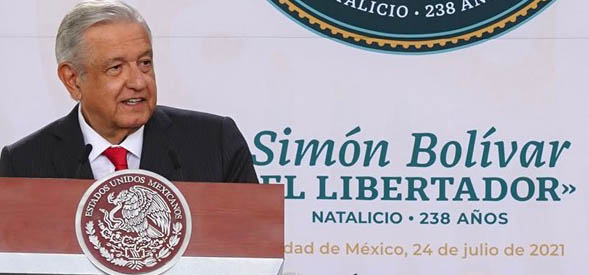The weekly newsletter of the México Solidarity Project

August 4, 2021/ This week’s issue/ Meizhu Lui, for the editorial team
Simón Bolívar, the Liberator of much of Latin America, promised his teacher, social reformer Simón Rodríguez, that he would “not rest his body or soul until he had succeeded in liberating the Spanish-American world from Spanish tutelage.” At a México City event celebrating Bolívar July 24, 2021, Mexican President Andrés Manual López Obrador challenged Latin American foreign and prime ministers to apply Bolívar’s spirit to today’s foremost hemispheric task:liberating the Latin-American world from US tutelage.
AMLO began his address tracing the history that led US President James Monroe to proclaim in 1823 the doctrine that bears his name, the notion that the US should never, as Thomas Jefferson had put it earlier that year, “allow Europe to meddle in affairs on this side of the Atlantic.” But that policy of “America for the Americans,” Obrador went on to note, “ended up disintegrating the peoples of our continent and destroying what Bolivar had built.” The meddling — “constant occupations, invasions, annexations” — would come from the United States.
What AMLO said next strikes us as so politically significant that we want to highlight right here, instead of our usual weekly introduction, the exact words he had to say. For AMLO’s entire speech, check this video of his presentation in Spanish and this English translation.
Now is the time for a new coexistence among all the countries of the Americas. We must put aside the dilemma of either integrating with the United States or opposing it defensively. It is time to explore another option, that of having a dialogue with US leaders and convincing them that a new relationship between the countries of the Americas is possible.
At present there are excellent conditions to achieve this goal of going forward together without anyone being left behind. We have powerful reasons to assert our sovereignty and demonstrate with arguments and without idle chatter that we are not a protectorate, a colony or their backyard. Furthermore, a factor favorable to our country has gradually been accepted: China’s disproportionate growth has strengthened the opinion in the United States that we should be seen as allies and not as distant neighbors.
We must jointly define very precise goals; for example, to stop rejecting migrants, mostly young people, when in order to grow we need a labor force that, in reality, is not sufficiently available in the United States or Canada. Why not study the demand for labor and open the migratory flow in an orderly manner? And within the framework of a new joint development plan, we should consider policies on investment, labor, environmental protection and other issues of mutual interest to our nations.
The proposal is no more and no less than to build something similar to the European Union, but in accordance with our history, our reality, and our identities.
In this spirit, the replacement of the OAS by a truly autonomous organization, not a lackey of anyone, but a mediator at the request and acceptance of the parties in conflict, in matters of human rights and democracy, should not be ruled out.

What is proposed here may seem utopian. However, without the horizon of ideals we will get nowhere and, consequently, it is worth trying. Let’s keep Bolívar’s dream alive.

Javier Bravo, a co-founder of the México Solidarity Project, teaches at the University of Guanajuato. He came to the United States on a fall 2019 speaking tour to explain the significance of the election of AMLO and Morena. Covid last year cancelled a second tour. An activist in Morena’s left, Bravo has been working to help us understand whether and how Morena can transform México into a sovereign nation governed by and for its poor and working classes.
Some feel that AMLO has been too appeasing toward the US. Does the speech he delivered July 24 to the Community of Latin American and Caribbean States help explain his approach to US relations?

Haga clic aquí para leer más!